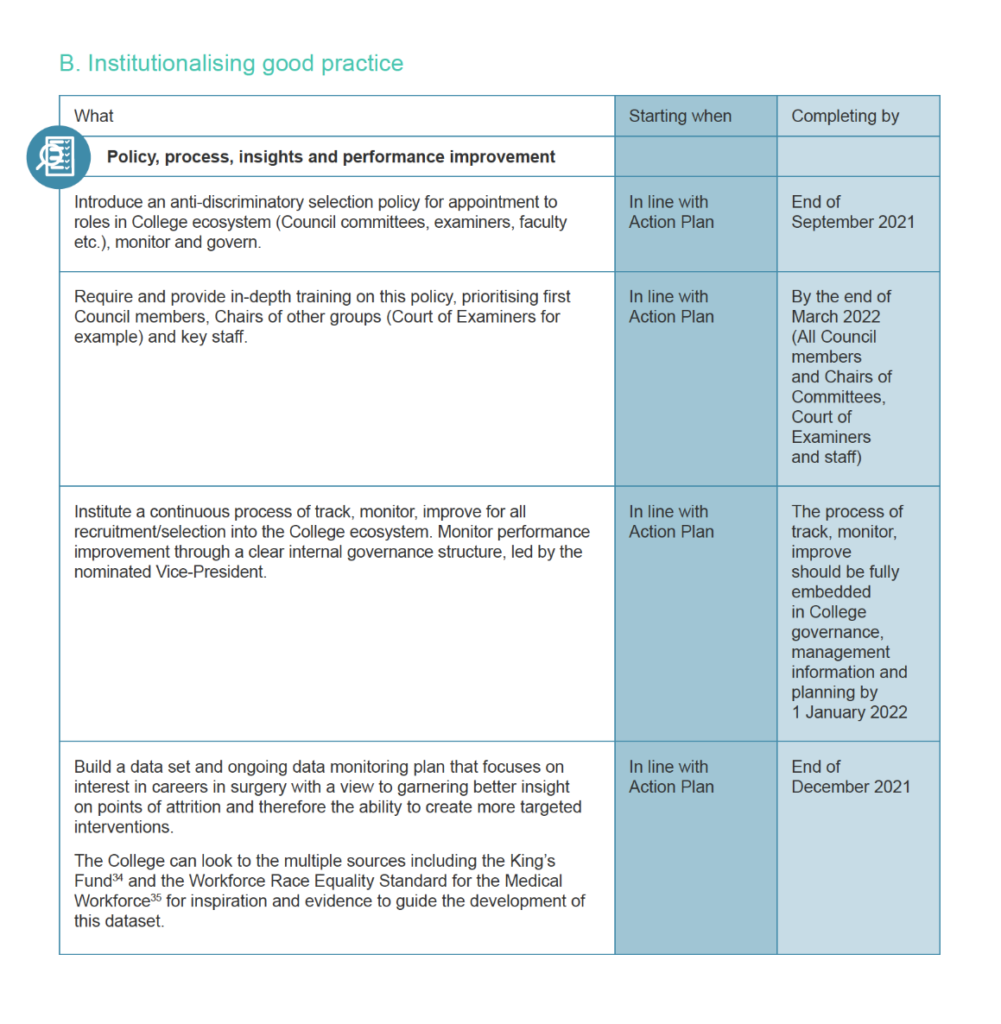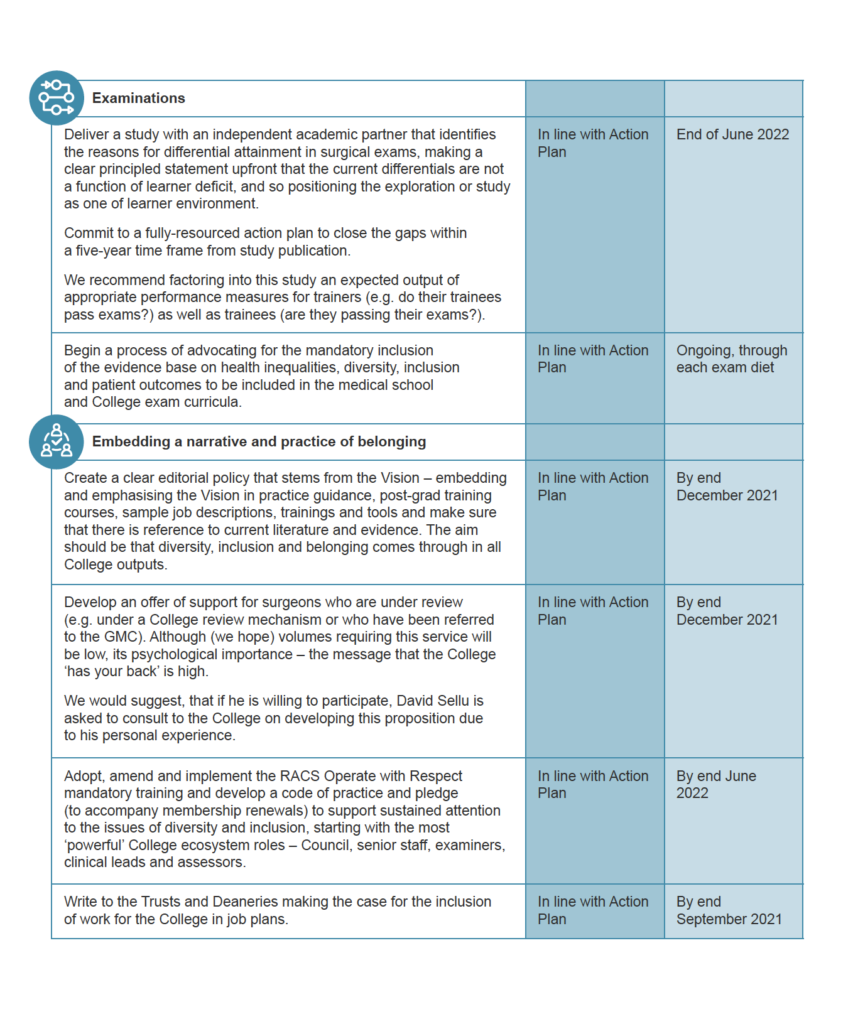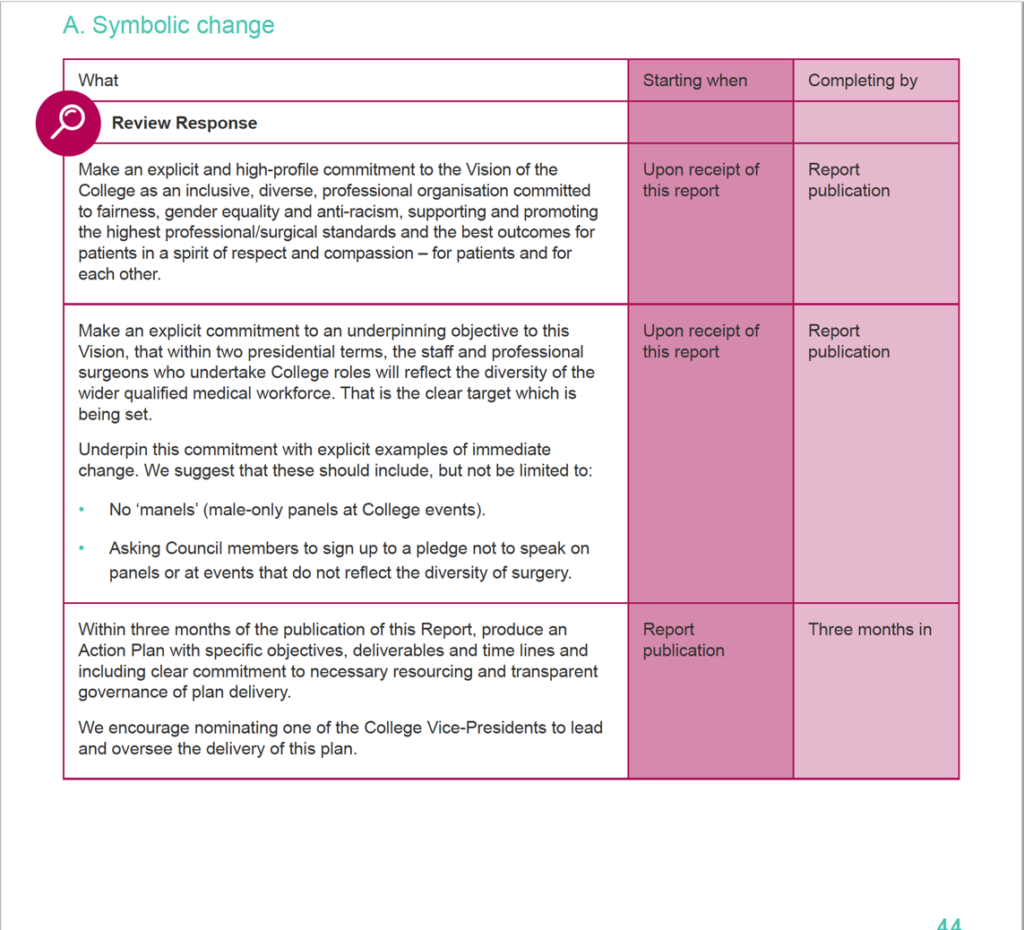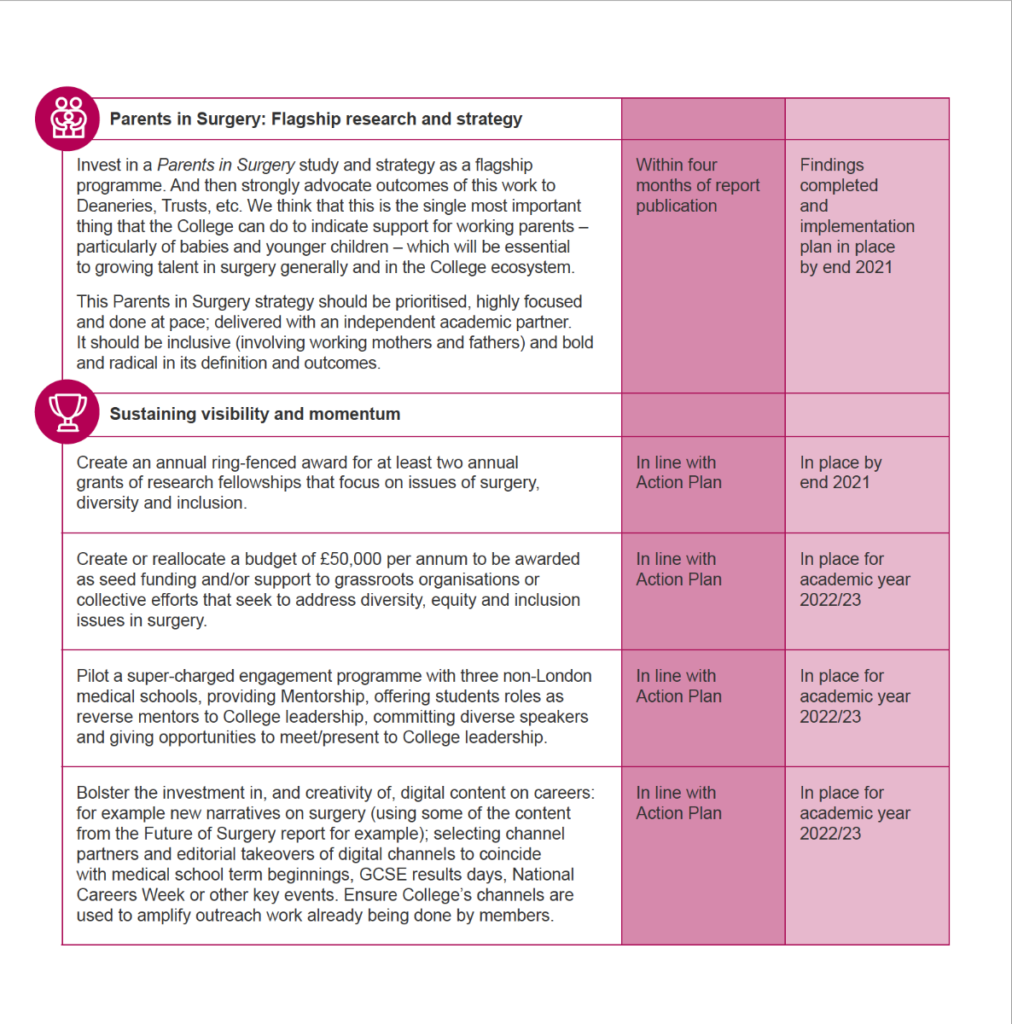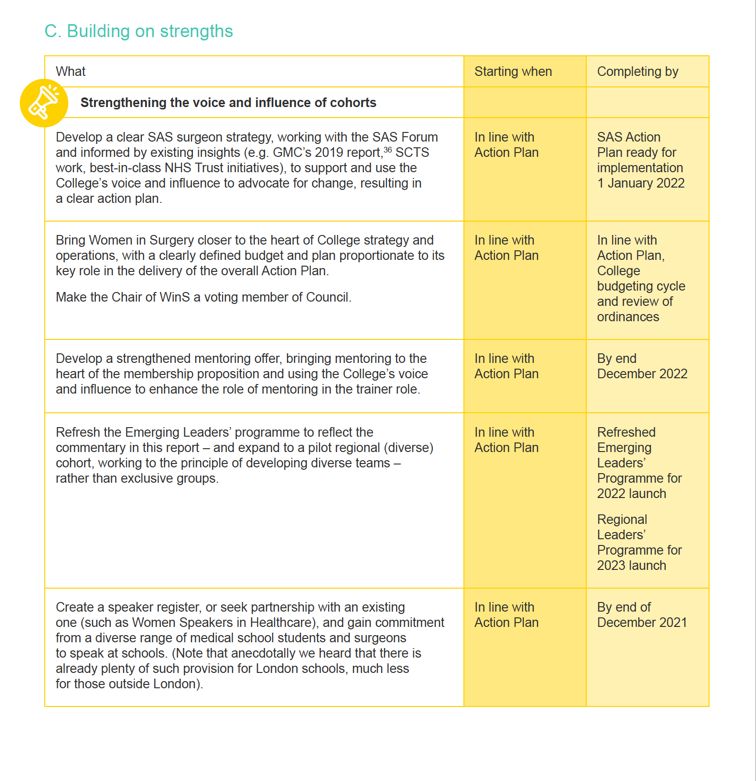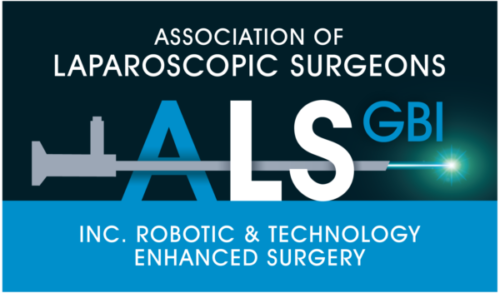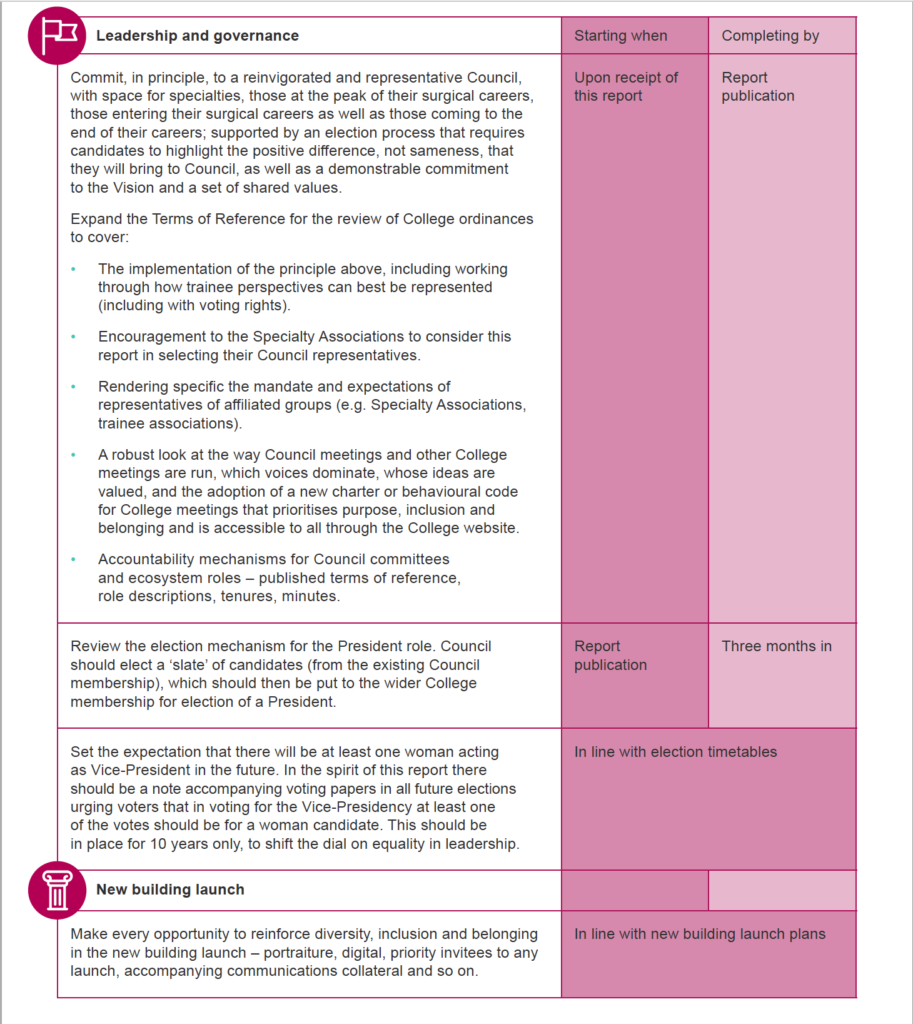ALSGBI EQUALITY, EQUITY, DIVERSITY AND INCLUSION STATEMENT
ALSGBI is an organisation that strives for excellence in all areas. We also seek to represent our membership, the wider surgical workforce, and our patient population with fairness. We recognise that equality, equity, diversity, inclusion, and an awareness of intersectionality must be at the core of our structure and policy if this is to be achieved.
ALSGBI is currently working alongside other organisations such as ACPGBI, AUGIS, ASGBI, ASiT, RCS WINS, PRISM and BOMSS as part of the Surgical EDI Network. We are united by shared values and a common aim; support, representation, respect and equal opportunities for surgical healthcare providers with differing experiences and characteristics, in order to facilitate and deliver optimal patient care.
The outcome of the RCS Eng. Kennedy Review highlighted the lack of diversity within the Royal College ecosystem and the need for the Surgical profession to not only reflect the society that we work in, but to foster an environment in which every kind of surgeon can thrive. As a pioneering body and standard for practice and training in minimal access surgery, ALSGBI recognises its significant role in the Surgical community and takes these recommendations seriously. We are committed to ensuring our activities are progressive, inclusive, and welcoming of cultural and cognitive diversity at every level.
To reflect ALSGBI’s aim of being an open-minded society that is representative of its wide-ranging membership and patient body, we have shared our 2021 aspirations and agenda for change. However, we know that words alone cannot achieve positive outcomes, so we have created a digital suggestion box on our website and pledge to embrace change, take action and be responsive to the variable needs and perspectives of those we engage with as an organisation.
Tamsin Morrison – ALSGBI Academy Chair, Past EDI Representative
David Mahon – ALSGBI President
Tan Arulampalam – ALSGBI President Elect
Anna Palepa – ALSGBI Academy Support Us Group Lead
Anil Reddy – ALSGBI EDI Lead
The ALSGBI Through the Keyhole podcast on Equality and Diversity is linked below:
#04 Diversity in Successful Surgical Teams. Dr Tamsin Morrison 23:02
Summary of the 2021 Kennedy Report Recommendations
To send an EDI enquiry, please click HERE
- The RCS Diversity Report was published 18th March 2021 with a view for improving diversity in Surgery and RCS England.
- It includes 16 key recommendations to be delivered within a 3 year timescale, which encompass: “Symbolic change, institutionalising good practice and building on strengths”.
- RCS England has committed to a reform target which states that within two Presidential terms, the Leadership and Council of the College will reflect the diversity of the wider medical workforce (5-6 years).
Who is this report is for?
- The Royal College – aiming to provoke and inspire the College itself towards a future blueprint and plan for a sustainable future.
- The qualified surgeon, trainee and aspiring surgeon – aiming to empower and enable necessary and sometimes difficult conversations about mutual respect and ways of welcoming colleagues into your midst.
- Health service professionals – aiming to foster discussion and engagement about the need for change.
Why?
- Professor Neil Mortensen’s (President of RCS England) decision to seek this report was encouraged by expressions of dissatisfaction from a significant part of the surgical profession and the most recent elections to leadership positions, which produced a line-up of distinguished senior men of the same ethnicity, who came from seemingly similar social backgrounds.
- Like many esteemed institutions, the College is remarkable, but it has developed over generations in ways that no longer serve its members equally, “maintaining organisational structures which are excluding and emanate an aura of the gentleman’s club”.
- It was felt that the College was not demonstrating itself to be a diverse and inclusive institution, reflecting the society in which we live or the changing profession of surgery.
- Reputation can be affected by negative feelings, as disaffection can cause long-term loss of confidence in an organisation.
- Examination of the statistics demonstrates that the complaints are well founded.
- The College represents the guardian of surgical professionalism and should have the wellbeing of its professionals as a major consideration.
A need for change?
- Cosmetic alterations by placing a few different faces in leading positions within an organisation will not bring resolution. To create real change, it is necessary to look further down the pipeline and identify the blockages that deter diverse groups from advancing to leadership roles.
- Some of the experiences of discrimination of more senior surgeons may be historical and change may have already rectified aspects of this, but it is still these experiences that are remembered and will be passed on to new generations unless a declaration of change is made.
- Of course, some deny the need for reform, dismiss some of the criticism in the report as distorted perceptions or see the issue of diversity and inclusion as a fashionable trend. But perceptions can drive people away from an institution.
- Protectors of the status quo can also fail to see that society has changed dramatically. Wider access to higher education has opened up opportunities for many who had previously been excluded and educational opportunities have transformed status and aspirations across society.
- Half of UK medical school students are now female. One third of surgeons are women. Our society is multi-ethnic, enriched by generations of immigration and the medical profession includes surgeons from a variety of backgrounds: surgeons of differing sexual orientations and ethnicities and surgeons with disabilities for example.
- The desire for diversity within the leadership of institutions is being felt across most fields and all the parts of our social infrastructure are being challenged.
- “The challenge is simple. How can positions of authority and power be the dominion of any one group of people? Surely a healthy democratic society opens opportunities to everyone, not just the traditional élites?”
- It is always a sign of good leadership when the person at the top takes the reins and looks for ways to address serious problems, but the profession must support them.
The Kennedy Report recommendations for change:
- Commit to the RCS England Vision, putting diversity at the heart of College strategy. To be an inclusive, diverse, professional organisation committed to fairness, and anti-discrimination, supporting and promoting the highest professional/surgical standards and the best outcomes for patients in a spirit of respect and compassion – for patients and for each other.
- Reform Target. Within two Presidential terms the Leadership and Council will reflect the diversity of the wider medical workforce. That means within five to six years from now.
- Reform Elections for Presidency. The Council should present a slate of potential candidates for this prestigious role. The slate of candidates should be presented to whole Membership and then voted upon.
- Reform Election for the Three Vice-Presidential Roles. The Council should again present a slate of candidates for election by the Membership. If the two candidates with the highest votes are male, the third Vice-Presidential place should go the woman with the highest votes. This should be in place for 10 years only, to shift the dial on equality in leadership.
- Reform Council.
- There should be three tiers of elected members
- Those entering surgery – four/six years
- Those at mid/senior level – (this cohort should be the largest in number – for Council to decide detail)
- Those in senior years of practice or retired
The Council should include representatives of Specialist Associations, Nominated Organisations and Lay Members. All should have voting rights.
It is hoped that the Specialist Associations will reform their organisations in keeping with the spirit of this report as that will have a real impact on the diversity of the composition of Council.
- Reform Election Process, Appointments, Committees and Conduct. Those standing for election should in their short electoral statement describe the positive difference not sameness that they will bring to Council. They should also commit to the Vision of the Royal College of Surgeons of England. There should be consistency and terms of reference for panels and committees and all should be diverse.The conduct of Council and Committee Meetings and every element of the College from committees to Exam Boards and the Board of Trustees should pledge to be respectful, value the ideas of others and make space for new and diverse voices.
- Develop a clear SAS Strategy. Work with the SAS Forum to create an overall action plan to give due recognition to the role of SAS practitioners.
- FLAGSHIP PROJECT – Parents in Surgery. The experience of parents, who are training to be surgeons or are busy surgeons in practice, is extremely challenging and stressful; it demands urgent attention. A Task Force should be established to work with Deaneries, Trusts and Hospitals to address more supportive structures and career paths. The work of the Task Force should feed into the restructuring planned by government.
- Deliver a Study on Differential Attainment in Surgical Exams. Make a clear principled statement up front that the current differentials are NOT the function of learner deficit. This firmly locates any study in the learning environment. This work should be undertaken with an independent academic partner with a declared intention that any gaps should be closed within five years of publication of the study. It should be fully resourced and prioritised.
- Launch Two Annual Research Fellowships into Surgery, Diversity and Inclusion. These fellowships should focus on under-developed areas in the body of evidence such as careers in surgery and the LGBT+ community, disabled surgeons and surgeons from disadvantaged backgrounds.
- Support Diverse Grassroots Medical Organisations with Seed Funding.
Provide seed funding and/or support to grassroots organisations or collective efforts that seek to address diversity, equality and inclusion issues in surgery.
- Build on the College’s strengths.
- Bring Women in Surgery closer to the heart of College strategy and operations.
- Refresh the Emerging Leaders’ Programme to reflect the recommendations in this Report.The end of the Firm structure within medicine, which provided a form of apprentice relationship between junior and senior surgeons, means that many young surgeons feel unsupported in their development. The College is the perfect home for Mentorship and one of the Vice-Presidents should have the specific role of developing a structured Mentorship scheme.
- Data Collection, Monitoring and Career Tracking. An organisation cannot know whether it is making progress on making opportunities available in a fair and inclusive way if there is inadequate collection of information. Proper processes for this collection and analysis of information must be put in place.
The Council will need to consider how to implement the recommendations of the Report as appropriate..
The recommendations in detail:
- This is an extraordinary, career-defining opportunity and an extraordinary time in surgery – it could be by design rather than circumstance that this Review follows the Future of Surgery Commission.
- College staff are already working to capacity and so investing in additional resources and creating adequate capacity for staff to understand, take on board and implement these proposals will be critical to success. We remind the College of both the strategic and moral importance of this work.
